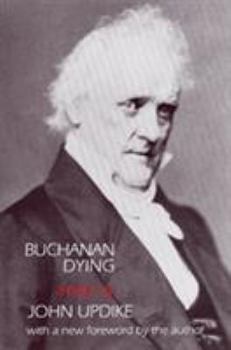Buchanan Dying
Select Format
Select Condition 
Book Overview
In a play meant to be read, James Buchanan, 15th President of the U.S., relives his political and private past. A new foreword and a wide-ranging afterword put the dramatic portrait in context. This description may be from another edition of this product.
Format:Hardcover
Language:English
ISBN:0811702383
ISBN13:9780811702386
Release Date:January 2000
Publisher:Stackpole Books
Length:288 Pages
Weight:1.05 lbs.
Dimensions:1.1" x 5.8" x 8.5"
Customer Reviews
2 ratings
Requiem for the Old Public Fuctionary
Published by Thriftbooks.com User , 17 years ago
For a major American writer to focus on a major American political figure is not unique. Gore Vidal offered us some interesting looks at Burr, Lincoln, Wilson, Harding and FDR in his various works of historical fiction. Caleb Carr presents a fun Teddy Roosevelt in "The Alienist". In "Buchanan Dying" and "Memoirs of the Ford Administration," John Updike offers an excellent portrait of the enigmatic James Buchanan whose administration presided over the shattering of the Union. While part of Updike's focus on an obscure president remains an homage to their native state of Pennsylvania, "Buchanan Dying" also retains an interesting, and important, political message. Updike's historical research is solid. His excellent afterword goes through the Buchanan Papers that were edited by James R. Moore as well as the standard biographies and histories of the coming of the Civil War. From Kenneth Stampp to Avery Craven to Allan Nevins to Roy Franklin Nichols, Updike is familiar with the leading works of the impending crisis. This reflects well as he incorporates real figures and conversations along with fictional conversations. The familiar pattern of events unfolds in Buchanan's mind. The death of Anne Coleman; the tense relationships with Jackson and Polk; Buchanan's ambitions and his tortured path to the presidency; the Dred Scott decision; the feud with Stephen Douglas over Lecompton; the secession of the South, all this plays out in the dying Buchanan's mind. Updike refers to this work as a "play meant to be read" and it probably would not be well adapted on the stage yet it is worth reading. While Buchanan remains a passive character (much like Rabbit?), Updike is fair to his historical memory. The secondary characters, from stern Jeremiah Black to the impish Harriet Lane to the slick John Slidell, remain impressive, realistic and stick to the historical record. The reader or the viewer does need some background with the era or some scenes make no sense, as when Buchanan and Douglas exchange words and bring up how conservative Democrats William Rives and Nathaniel Tallmadge were run out of the pary in the late 1830s. One theme which lingers in the play is that men in power often do the best they can despite themselves. In an age when protesters demanded how many kids LBJ killed that day, when Bill Clinton was hounded for his personal life as well as for taking part in numerous conspiracy theories, when George W. Bush is constantly accused of abominations, this play serves as a reminder that failed political leadership is more often the product of incompetence as opposed to evil intentions (the character of John Floyd seems to be the best reminder of that). Updike shows a Buchanan who was more devoted to the Union than the South and the North would have thought possible. Updike's Buchanan recognizes that the way he handled the secession crisis gave Lincoln a gift. Clearly Updike does not see Buchanan's administration as a failed presidency and, wi
Ever Candid, Ever Wizened
Published by Thriftbooks.com User , 23 years ago
This Stackpole Books edition is virtually a photocopy facsimile of the first Knopf edition in 1974, dust jacket and all. Updike's new Foreword recounts the two productions of the play, in abbreviated form, by Franklin and Marshall College (April 28-May 8, 1976) and San Diego State University (March 1977) and reminds us of the fact that "Leadership of any country but one in a comic operetta involves some decisions whose consequences are bloody" and that this book is his attempt was "to extend sympathy to politicians, as they make their way among imperfect alternatives toward a hidden future" (p. ix). Once again there, as in his memoir Self-Consciousness, he observes how for him this sympathy applied to Lyndon Johnson during the Vietnam War. He also observes from this writing experience how "history" is constructed in the fragility of the writer's judgment in weighing and interrogating the disparate data forms from which descriptive writing emerges. A wise scholar named Van Harvey in his book, The Historian and the Believer, once observed that what we call "history" is a field-encompassing field and requires from the historian the skillful interpretation and weaving together of information from many disciplines--psychology, sociology, anthropology, economics, geography, religion, and politics, including some awareness of their important sub-disciplines. Such difficulties notwithstanding, Updike warns that "the effort to delve into history left me convinced of the unconscionable amount of bluff, fraud, and elision that any allegedly historical account, labeled fiction or not, entails." This is precisely the sort of wizened sensitivity which we have come to expect and appreciate in Updike's work.





